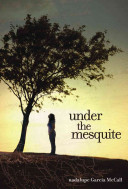
Lupita, a budding actor and poet in a close-knit Mexican American immigrant family, comes of age as she struggles with adult responsibilities during her mother’s battle with cancer in this young adult novel in verse. When Lupita learns Mami has cancer, she is terrified by the possibility of losing her mother, the anchor of her close-knit family. Suddenly, being a high school student, starring in a play, and dealing with friends who don’t always understand, become less important than doing whatever she can to save Mami’s life. While her father cares for Mami at an out-of-town clinic, Lupita takes charge of her seven younger siblings. As Lupita struggles to keep the family afloat, she takes refuge in the shade of a mesquite tree, where she escapes the chaos at home to write. Forced to face her limitations in the midst of overwhelming changes and losses, Lupita rediscovers her voice and finds healing in the power of words. Told with honest emotion in evocative free verse, Lupita’s journey toward hope is captured in moments that are alternately warm and poignant. Under the Mesquite is an empowering story about testing family bonds and the strength of a young woman navigating pain and hardship with surprising resilience.
See the review at WOW Review, Volume IV, Issue 4
This book has been included in WOW’s Language and Learning: Children’s and Young Adult Fiction Booklist. For our current list, visit our Booklist page under Resources in the green navigation bar.
- ISBN: 9781600604294
- Published: 2011 , Lee & Low Books
- Themes: changes, Death, Escape, Family, Responsibility and duty
- Descriptors: Latinx in US, Nonfiction, Realistic Fiction, Young Adult (ages 14-18)
- No. of pages: 224

Becca:
Under the Mesquite by Guadalupe Garcia McCall really resonated with me. The text is written in verse which is sprinkled with words in Spanish. The novel is through the eyes of a young girl, Lupita, who is confronted with many challenges. Her family is from Mexico and they have moved to United States. Her father is a hard worker and is gone all week on jobs, her mother is loving and kind, but she soon finds out that her mother has cancer. McCall does a wonderful job of showing through words and emotions the love that holds this family together, and the love both parents have for their children. Towards the end of novel, Lupita’s father suggests she return to her roots to try and overcome the loss of her mother. Lupita does so and travels to stay for an extended time with her grandmother. Cultural details were sprinkled throughout the novel, and my curiosity was piqued about the author. After looking up her biography, I found that she too experienced immigration to the United States from Mexico, and the setting for this novel is the same as where she lived as a young child. Her past experiences come through the text and makes it a more authentic and accurate read.
Holly:
I really liked the book, too, Becca! The use of language seems authentic and the character of Lupita very realistic. I cannot imagine the struggles she had to go through as a high school student trying to make sure her younger siblings go to school, do their homework, and generally not get in trouble while both of their parents were away. I also imagine that some readers might not understand how often it happens that an older sibling raises the family during a crisis while other readers know exactly what it is like to take on the responsibilities of parenting because of the need for parents to be away. I think, however, that Lupita had a strong network within her community, and she had a strong sense of who she was, which helped her get through her own crisis of negotiating the life she had as a student and the one she was living as the older sister. Her poetry helped her cope as well, which is another powerful aspect of the novel.
It is interesting reading this in juxtaposition to Home of the Brave. Both of them are stories of displacement, renegotiation of life without the key support of close family members, and learning to life the life given you, with all its hardships. Really nice read.